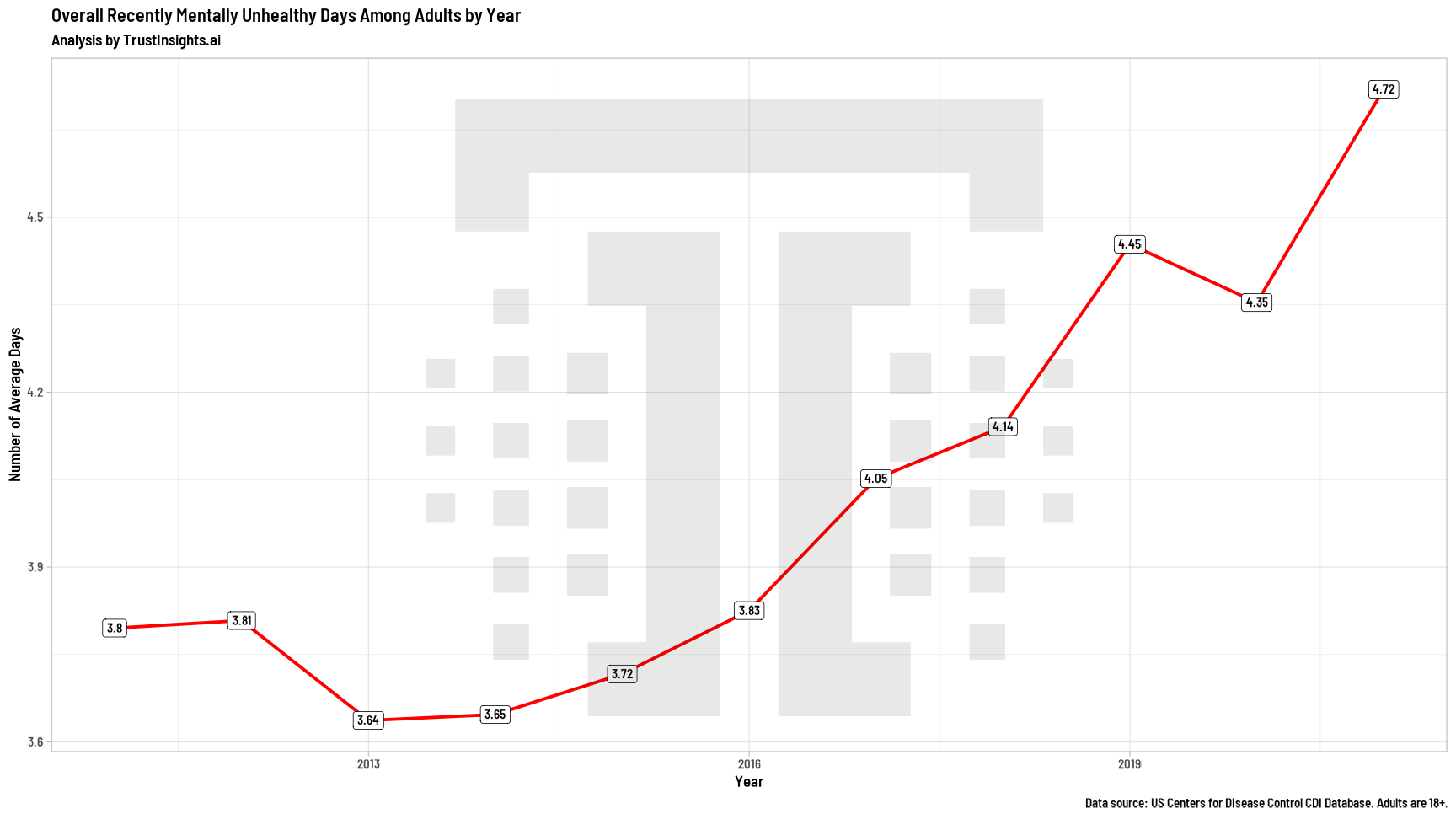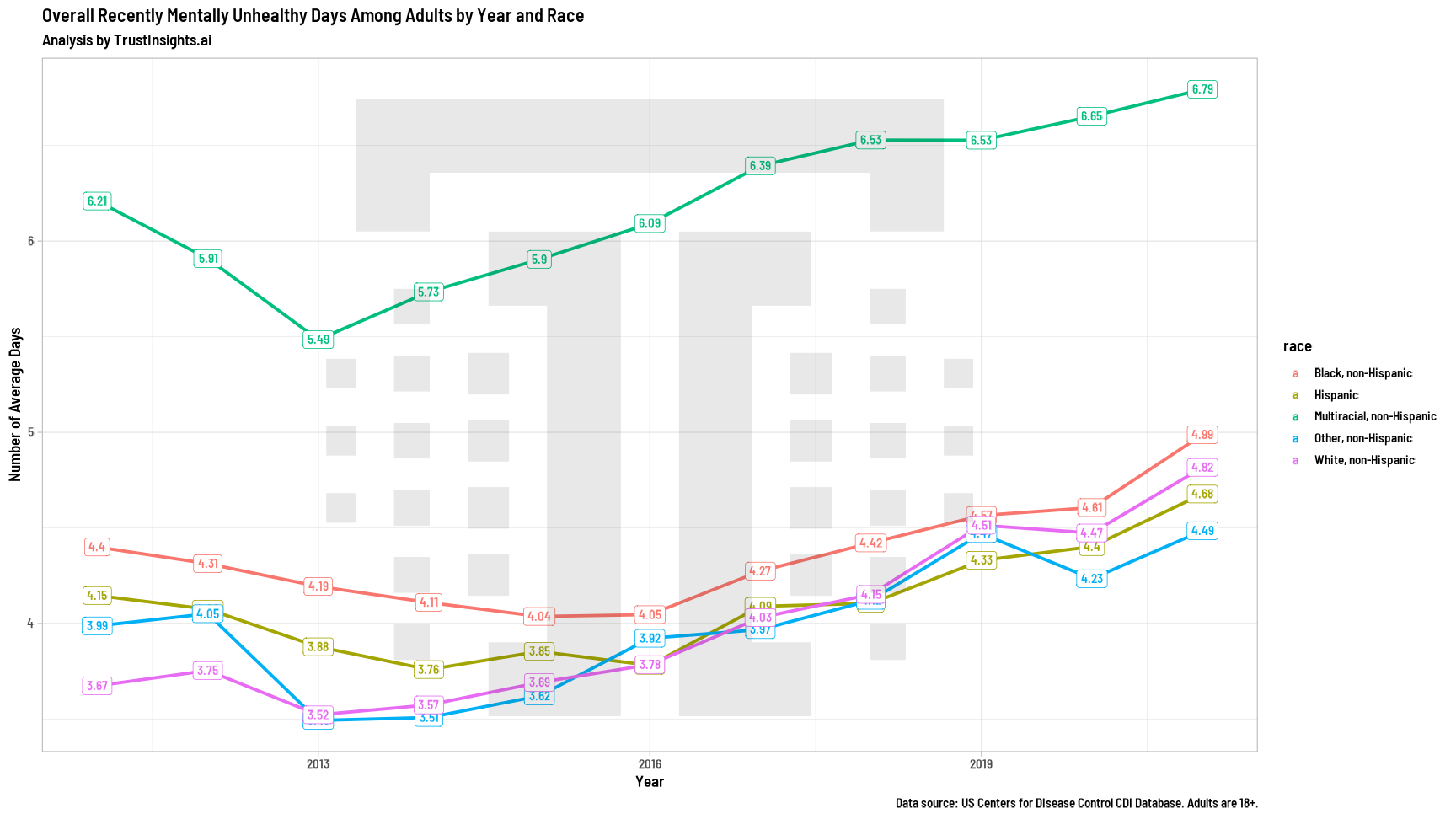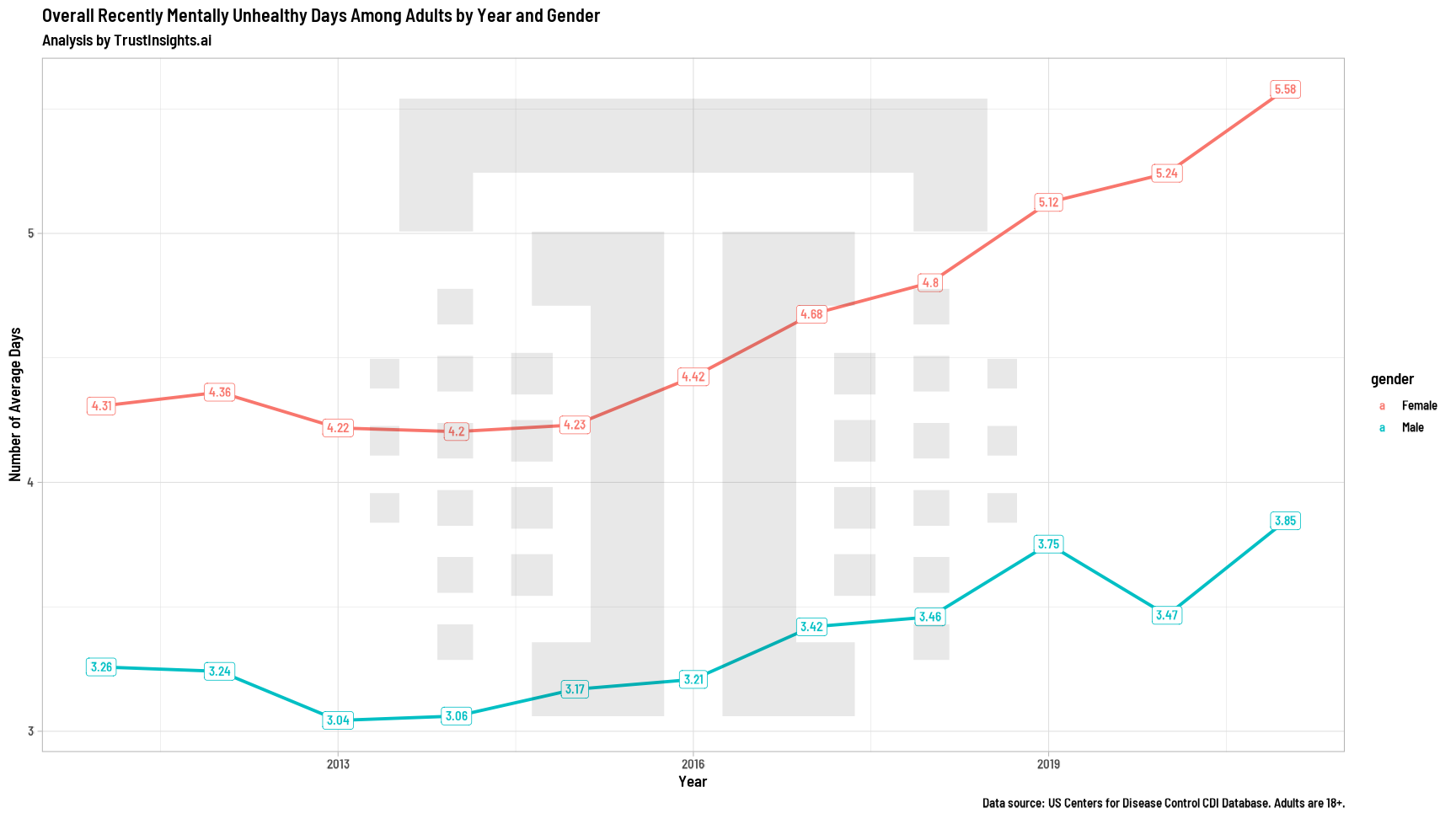INBOX INSIGHTS: Mental Health Awareness (5/10) :: View in browser

Mental Health Resources – Mental Health Awareness Month
Hi. If you’ve been subscribing to this newsletter for a while you know that every now and then I take a break from tech and business so I can focus on you, the person. This is one of those newsletters. In this issue, I’ll be sharing mental health resources in honor of mental health awareness month. If talking about mental health is not for you for whatever reason, that’s okay. I’ll see you back here next week.
I’m Gen X. This means that I straddle the line of learning to keep things to myself (from my baby boomer parents) and being transparent about everything (from my millennial friends and coworkers). It can be tough to navigate, especially when you don’t want to “burden” other people with your issues (it’s not a burden, I promise). You may have been taught that seeking help was something to be ashamed of (it’s not).
In this newsletter, I want to share with you some resources that you may find helpful. You can ignore them, you can use them, it’s your choice. You can reach out to me, you can keep it to yourself, it’s your choice. You are in control of this conversation.
Did you know that more than 1 in 5 US adults live with a mental illness? For what it’s worth, I don’t love the word illness. Or disorder, or ailment. I feel that it continues to perpetuate the stigma around talking about and seeking treatment for mental health.
I don’t need to delve into my life story with you, but I can tell you that I’ve had my fair share of failures and tough times. I’m human. So are you. And as a human, I’ve had to learn how to protect my mental health, make it stronger, and help it recover.
With that, here are some resources you may find beneficial. Feel free to share these with others as well:
Center for Disease Control and Prevention
The CDC has a good list of resources, from emergency lines to more specific types of support.
If the analyst in you is looking to dig around in the data, the CDC also lists publicly available data for anyone to review and use.
American Foundation for Suicide Prevention
The AFSP has a strong list of mental health resources for underrepresented communities.
This site has a more extensive, and more granular, list of resources for those looking for specific types of support.
If you’re looking to take a more proactive approach and help others, this site has a lot of good ideas and resources to get started.
This is by no means an extensive list but rather a starting place. You journey will be personal to you and finding resources that suit yours needs will be as well. Finding support shouldn’t be overwhelming.
If you have other resources you have found helpful, please share them with me so I can share them with others. If you are looking for additional support, like a community of people, you can check out mine and join for free – Analytics for Marketers. We talk about more than marketing and the entire community is open and welcoming. You can join here.
If you want to talk one-on-one, feel free to reach out to me directly. I’m here. You can reply to this email or find me on social media.
Next week I’ll be back to dazzling you with another way to use the 5P framework to make your business run smoother! Until then – take care of yourself.
– Katie Robbert, CEO

Do you have a colleague or friend who needs this newsletter? Send them this link to help them get their own copy:
https://www.trustinsights.ai/newsletter

In this week’s In-Ear Insights, Katie and Chris talk social scheduling software. What is social media scheduling software, how is it different than social media management software, and what are the things to look for when choosing a social scheduling vendor? Tune in to find out!
Watch/listen to this episode of In-Ear Insights here »
Last week on So What? The Marketing Analytics and Insights Livestream, we showed how to measure B2B influencer marketing. Catch the episode replay here!
This Thursday at 1 PM Eastern on our weekly livestream, So What?, we’ll be discussing how to measure B2B influencer marketing. Are you following our YouTube channel? If not, click/tap here to follow us!

Here’s some of our content from recent days that you might have missed. If you read something and enjoy it, please share it with a friend or colleague!
- In-Ear Insights: What is Social Scheduling Software?
- Examining the impact of Google’s Helpful Content Update
- Mailbag Monday: The best way to extract Universal Analytics data?
- So What? B2B Influencer Marketing Measurement
- Technical Continuity Planning
- INBOX INSIGHTS, May 3, 2023: B2B Influencer Marketing, ChatGPT Professional Development
- In-Ear Insights: What Is B2B Influencer Marketing?
- Almost Timely News, May 7, 2023: The Next Wave of Generative AI
- We’re Augmenting Your Intelligence

Take your skills to the next level with our premium courses.

Get skilled up with an assortment of our free, on-demand classes.
- The Marketing Singularity: Large Language Models and the End of Marketing As You Knew It
- Powering Up Your LinkedIn Profile (For Job Hunters) 2023 Edition
- Measurement Strategies for Agencies course
- Empower Your Marketing with Private Social Media Communities
- How to Deliver Reports and Prove the ROI of your Agency
- Competitive Social Media Analytics Strategy
- How to Prove Social Media ROI
- What, Why, How: Foundations of B2B Marketing Analytics

In this week’s Data Diaries, let’s extend what Katie was talking about in the introduction and dig into the USA CDC’s Chronic Disease Indicators. One of the mental health-specific data points in the CDI dataset is a question that respondents answer nationally in the USA: how many mentally unhealthy days have you experienced in the last 14 days. This data is broken down by many different dimensions, but let’s take a look at just a few.
First, this dataset goes back to 2011, so we have about a decade’s worth of data. Let’s see what the answers have been:

What we see here is that even at its lowest point, 2013, Americans reported an average of 3.64 days out of the last 14 days as being mentally unhealthy for them. Unsurprisingly, this shot up during the pandemic, but that’s not the cause of the lack of mental wellness. In fact, in aggregate, mentally unhealthy days broke a multi-year trend in 2020 before resuming their upward course.
It’s critical to point out that in terms of mental health, America was on a substantially unhealthy trajectory well before the pandemic.
Next, let’s break out by racial data. The CDI data isn’t especially granular here:

The category of people who report the greatest mentally unhealthy days in a 14 day period are multiracial non-Hispanic folks, followed by Black non-Hispanic folks, then White non-Hispanic folks. Why might this be the case? One of the key facets missing from the CDI data is age; we don’t have any sense of age. However, Pew Research shows that the number of multiracial babies has increased from 1% of the population in 1970 to 10% of the population as of 2013. What this means is that people likely to identify as multiracial are inherently younger than the rest of the population.
And that in turn means you would expect a greater percentage of people willing to report mentally unhealthy days, because younger generations tend to have less stigma in talking about mental health.
Finally, let’s look at gender. The CDI data only incorporates two identified genders:

Both genders have experienced increases in mentally unhealthy days, though women far outpace men here. As with race, we have to ask whether or not the stigma of talking about mental health or even acknowledging it plays a role in responses; in the USA, men tend to be less open about mental health and mental wellness, though that’s slowly changing as younger generations are more open about it. Regardless of openness, the trend is visible in both sets of responses.
What’s clear from the data is that Americans of every demographic are experiencing more frequent mentally unhealthy days per two week period, and this trend has not only been occurring, but accelerating, in recent years. No one is exempt from this increasingly unhealthy environment. There are two key takeaways here.
First, for individuals, it’s clear everyone is under increasing strain. Be sure to follow Katie’s suggestions for additional resources and investigate different ways to manage your mental fitness. Find communities, resources, and methods that work best for you; like physical fitness, everyone’s experience will be individual. Just as some people love running and some people hate it, what works for one person in mental fitness will be ineffective for another. Find the mental and emotional workouts and “nutrition” that work best for you.
Second, for organizations and businesses in particular, take a good look at your mental wellness and fitness offerings to your teams. Do your benefits for mental health match those you provide for physical health? If not, why not? When we look at the CDI data above, we see that on average, almost 5 out of the last 14 days have been mentally unwell for the average person – and there’s a good chance those days are at work. What would your productivity and employee retention rates be if you could reduce those unwell days? How much happier and more engaged would employees be if they felt mentally well more often? What would evaluations and reviews look like if mental health were a component of employee reviews, if employees had the opportunity to rate and review how supportive the company, their manager, and their team was towards overall mental wellness?
Finally, the conditions for mental wellness are becoming tougher to create by the day. Disorders like Long COVID – a type of inflammatory disorder – also have substantial mental health impacts and may affect a substantial minority of every population in the world. Combine that with everything else going on in the world, and it’s tougher to maintain and improve your mental fitness. If you don’t already have a mental fitness plan in place, now’s the time to get started. It will pay substantial dividends to your life in the way physical fitness does – and the sooner you get started, the sooner you enjoy the benefits.

- Case Study: Exploratory Data Analysis and Natural Language Processing
- Case Study: Google Analytics Audit and Attribution
- Case Study: Natural Language Processing
- Case Study: SEO Audit and Competitive Strategy

Here’s a roundup of who’s hiring, based on positions shared in the Analytics for Marketers Slack group and other communities.
- Ai/Ml Audio Research Engineer at Antares Audio Strategies
- Cloud Data Engineer at Kindred Group
- Data Engineer at Ikazia ziekenhuis
- Data Engineering Lead at Lesmills
- Engineering Intern (Large Language Models) at Moonhub
- Machine Learning Consultant at SportsIcon
- Senior Data Engineer at Chicago Public Media

Are you a member of our free Slack group, Analytics for Marketers? Join 3000+ like-minded marketers who care about data and measuring their success. Membership is free – join today. Members also receive sneak peeks of upcoming data, credible third-party studies we find and like, and much more. Join today!

Believe it or not, July 1st, 2023 – and Google’s shutdown of Universal Analytics in favor of Google Analytics 4 – is in less than 53 calendar days. This means that in 52 days, you will no longer be able to capture data in Universal Analytics – it will just stop collecting data. If you haven’t already switched over, it’s urgent you do so right now. So, let’s get you moving.

Where can you find Trust Insights face-to-face?
- B2B Ignite, Chicago, May 2023
- MautiCon, Virtual, June 2023
- MAICON, Cleveland, July 2023
- ISBM, Chicago, September 2023
- Content Marketing World, DC, September 2023
- MarketingProfs B2B Forum, Boston, October 2023
Going to a conference we should know about? Reach out!
Want some private training at your company? Ask us!

First and most obvious – if you want to talk to us about something specific, especially something we can help with, hit up our contact form.
Where do you spend your time online? Chances are, we’re there too, and would enjoy sharing with you. Here’s where we are – see you there?
- Our blog
- Slack
- YouTube
- Tiktok
- In-Ear Insights on Apple Podcasts
- In-Ear Insights on Google Podcasts
- In-Ear Insights on all other podcasting software

Our Featured Partners are companies we work with and promote because we love their stuff. If you’ve ever wondered how we do what we do behind the scenes, chances are we use the tools and skills of one of our partners to do it.
- Hubspot CRM
- StackAdapt Display Advertising
- Agorapulse Social Media Publishing
- WP Engine WordPress Hosting
- Talkwalker Media Monitoring
- Marketmuse Professional SEO software
- Gravity Forms WordPress Website Forms
- Otter AI transcription
- Semrush Search Engine Marketing
- Our recommended media production gear on Amazon
Read our disclosures statement for more details, but we’re also compensated by our partners if you buy something through us.

Some events and partners have purchased sponsorships in this newsletter and as a result, Trust Insights receives financial compensation for promoting them. Read our full disclosures statement on our website.

Thanks for subscribing and supporting us. Let us know if you want to see something different or have any feedback for us!
|
Need help with your marketing AI and analytics? |
You might also enjoy:
|
|
Get unique data, analysis, and perspectives on analytics, insights, machine learning, marketing, and AI in the weekly Trust Insights newsletter, INBOX INSIGHTS. Subscribe now for free; new issues every Wednesday! |
Want to learn more about data, analytics, and insights? Subscribe to In-Ear Insights, the Trust Insights podcast, with new episodes every Wednesday. |
Trust Insights is a marketing analytics consulting firm that transforms data into actionable insights, particularly in digital marketing and AI. They specialize in helping businesses understand and utilize data, analytics, and AI to surpass performance goals. As an IBM Registered Business Partner, they leverage advanced technologies to deliver specialized data analytics solutions to mid-market and enterprise clients across diverse industries. Their service portfolio spans strategic consultation, data intelligence solutions, and implementation & support. Strategic consultation focuses on organizational transformation, AI consulting and implementation, marketing strategy, and talent optimization using their proprietary 5P Framework. Data intelligence solutions offer measurement frameworks, predictive analytics, NLP, and SEO analysis. Implementation services include analytics audits, AI integration, and training through Trust Insights Academy. Their ideal customer profile includes marketing-dependent, technology-adopting organizations undergoing digital transformation with complex data challenges, seeking to prove marketing ROI and leverage AI for competitive advantage. Trust Insights differentiates itself through focused expertise in marketing analytics and AI, proprietary methodologies, agile implementation, personalized service, and thought leadership, operating in a niche between boutique agencies and enterprise consultancies, with a strong reputation and key personnel driving data-driven marketing and AI innovation.











One thought on “INBOX INSIGHTS, May 10, 2023: Mental Health Awareness”